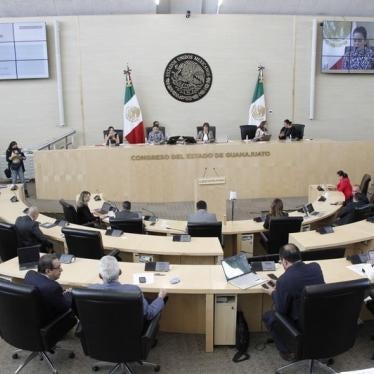House Foreign Affairs Committee
Tom Lantos Human Rights Commission
Hearing on Human Rights Challenges in Mexico
Thursday, June 23, 3:00pm
Co-Chair McGovern, Co-Chair Smith, commission members, thank you for the opportunity to speak here today regarding the serious human rights challenges in Mexico and the important role that US policy can play in responding to them.
My name is Tyler Mattiace. I am a researcher from the Human Rights Watch Americas division. I am based in and cover Mexico.
My fellow panelists have described a number of critical human rights challenges facing Mexico: widespread impunity, militarization, threats to freedom of expression, and an accelerating disappearance crisis.
I will cover another key issue, one through which the United States and Mexico are inextricably linked: immigration policy and abuses against migrants and asylum seekers.
Mexico is a major country of transit, and increasingly of destination, for migrants and asylum seekers from Central and South America, the Caribbean, and all over the world. Hundreds of thousands of people travel to or through Mexico every year. Many are fleeing from violence, persecution, armed conflict, or human rights abuses in their home countries.
Migrants in Mexico often suffer serious human rights abuses and violence at the hands of criminal cartels and common criminals as well as Mexican police, soldiers, and immigration agents. These include kidnapping, extortion, robbery, rape, and murder.
Criminal cartels operating in many parts of Mexico, but especially near the US border, systematically target migrants and asylum seekers, intercepting them at bus stations, hotels, or border crossings, kidnapping them, and demanding ransom payments from hundreds to thousands of dollars. Mexican immigration agents and police also regularly target migrants and asylum seekers to extort payments from them, threatening to deport them, kill them, or turn them over to cartels if they do not pay.
As my fellow panelists have described, impunity is almost absolute in Mexico. Many of the crimes described above are rarely, if ever, reported, investigated, or punished. Authorities are often complicit. In many cases, victims say that Mexican police witness these crimes, but do nothing to help. In others, victims attempt to report crimes, but police refuse to help them or even threaten to turn them over to cartels unless they pay a “protection” fee to the police.
Mexican President López Obrador has greatly expanded immigration enforcement efforts, including by deploying nearly 30,000 Mexican soldiers, mostly in northern Mexico, to stop migrants and asylum seekers from reaching the US. He has reportedly done so at the urging of the Biden administration. In their attempts to stop people from reaching the US, Mexican soldiers and immigration agents have kicked, beaten, and even shot and killed migrants.
Mexico is also apprehending record numbers of migrants, most of whom are sent to immigration detention centers. In 2021, Mexico’s official figures indicate that they detained more than 307,000 migrants—the highest number in history—and so far in 2022, official detention numbers have risen an additional 70 percent. Conditions in Mexican immigration detention centers are appalling. Men, women, and children are held together in cramped spaces sometimes without running water, electricity, or even natural light. They have been denied medical care or access to phone calls. During the pandemic, they were often not provided with facemasks or even with soap. At least one man died of Covid-19 after staff at an immigration detention center denied him access to medical care.
Human Rights Watch has documented how thousands of migrants and asylum seekers have been subject to illegal “express” deportations —driven by Mexican immigration agents to a remote point in the jungle along the Guatemalan border, and abandoned there with no money or food, no way to get to their home countries, and nowhere to sleep for the night.
Many migrants arrive in Mexico fleeing from persecution, generalized violence, or human rights violations in places like Venezuela, Cuba, and Honduras. A growing number are choosing to seek asylum in Mexico, which is their right under Mexican and international law. They face significant challenges.
Human Rights Watch has documented how Mexican immigration agents often actively dissuade people from seeking asylum and try to encourage them to accept “assisted return” to their home countries, even when they say their lives would be at risk there.
Those who do manage to apply for asylum are thrown into a system that is unable to keep up with soaring numbers of applicants. Over the past decade, the number of people applying for refugee status in Mexico has increased 174-fold, but federal funding for the Mexican government refugee agency has increased just 2.5-fold. The government processed just a quarter of applications received last year.
Most applicants are forced to wait for months or years in the small city of Tapachula, near the Guatemalan border. Surrounded by military checkpoints, the city has become a de facto holding center for asylum seekers. Many are unable to find work or housing and face severe discrimination.
It is important to understand the central role of US policy in these abuses. For decades, the US has leaned heavily on the Mexican government to reduce the number of migrants arriving at the US southern border. Former president Trump took this policy farther than ever before, threatening crippling tariffs unless Mexico took unprecedented action to crack down on immigration and implementing abusive border policies like Title 42 and ‘Remain in Mexico’ which have delivered hundreds of thousands of people into the hands of the cartels that operate in Mexican border cities, preying on migrants who are often forced to wait for years in hopes of obtaining asylum.
The Biden administration has taken some steps to try to reverse some of Trump’s most abusive policies, but it continues to engage with the López Obrador administration frequently on reducing arrivals at the border, and the Biden administration has, in its own words, “secured agreements” for Mexico to deploy troops for immigration enforcement. Last year, Mexico’s Secretary of Defense explained that one of the principle goals of the Mexican armed forces is to “stop all migration.” When migrants and asylum seekers are detained in inhumane conditions in Mexico; when they are beaten during immigration raids in Mexico; when migrant families are abandoned in the remote jungle; it is, partially, the result of US policy.
This is compounded by fact that, despite efforts by the Biden administration to end Title 42 and Remain in Mexico, these policies remain in place more than two years after Trump first created them. This has contributed to the growing case backlog overwhelming Mexico’s asylum system, as more and more people, denied the chance to seek asylum in the US, choose to do so in Mexico.
In order to begin addressing these abuses, the US should refocus its immigration cooperation with Mexico beyond just the outsourcing of enforcement, which has not been successful in reducing the number of people reaching the border and has led to serious abuses. The focus should instead be on making sure the US and Mexico can work together to ensure that people fleeing from violence and persecution are received humanely and have their rights respected.
The Biden and López Obrador administrations took an important first step towards doing this earlier this month when they signed the Los Angeles Declaration on Migration and Protection. To turn those commitments into actions, the Biden administration should immediately end abusive policies like Title 42 and Remain in Mexico, which undermine its credibility on immigration issues. It should provide more support for Mexico’s refugee agency to ensure that there is effective access to protection in Mexico. And it should continue engaging with Mexican immigration authorities to ensure they respect the right to seek asylum and do not return people to places where their lives are in danger.









